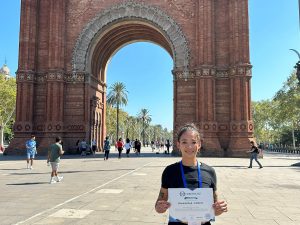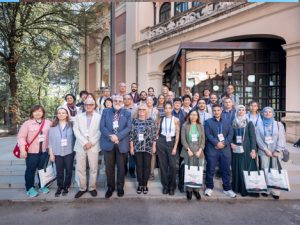Social micro-learning platform for visually impaired and blind pupils presented

The 15th International Conference on Education Technology and Computers (ICETC) took place at the Universitat de Barcelona from September 26 to 28. Out of 280 submissions, researcher Daniela Duh was one of the 109 accepted with her paper “Design and Development of a Social Micro-Learning Platform in the context of Tactile Learning Materials for Students with Visual Impairments”. She presented the TaTaBooks project: a social micro-learning platform for visually impaired and blind students.
Social Micro-Learning platform
The article by Daniela Duh and Bernhard Göschlberger with Economica partners Michael Boch, Georg Graser, Miriam Gross, Andrea Pitzschke and Eva Sengschmid deals with the development of a social microlearning platform (https://tata.soml.it), which was expanded to complement tactile learning materials – i.e. TaTaBooks. The authors describe the embedding of new functions for teachers and learners: The target group are visually impaired and blind pupils* as well as their teachers. Social MicroLearning is an approach to how information is presented in order to be absorbed as quickly as possible by learners. On the SOML platform, users can acquire learning content in the form of flashcards (multiple choice, single choice, audio questions, …) and exchange teaching materials in order to print their own TaTaBooks.
Tactile learning materials
In the TaTaBooks project – Talking Tactile Books – the researchers are focusing on the creation of learning materials using 3D printing that simultaneously impart knowledge and entertain. In addition to the tactile materials, these are supplemented by audio and online learning content. The advantages of TaTaBooks are their reproducibility and adaptability. They can be used and designed individually in everyday teaching.
Technology as a catalyst
ICETC is a conference that addresses the intersection of education, technology and innovation. This year’s focus was on technology as a catalyst for transformative learning experiences. Topics covered included Artificial Intelligence in the classroom (new opportunities for inclusion, challenges posed by technologies such as ChatGPT and ethical issues raised) and the changes and developments brought about by the Covid-19 pandemic. In addition, the need to introduce children to concepts of computer science and computational thinking at a young age in order to adequately prepare them for a job market in constant digitalization was discussed.

Lively exchange between stakeholders
The conference offered researchers and practitioners from many different countries (USA, Australia, Israel, Greece, China, Austria, Germany, Turkey, …) the opportunity to present and discuss their latest research results, experiences and findings in the field of educational technology and IT. “We all have similar challenges in education, so it’s always interesting to see and hear different perspectives,” says Daniela Duh.

